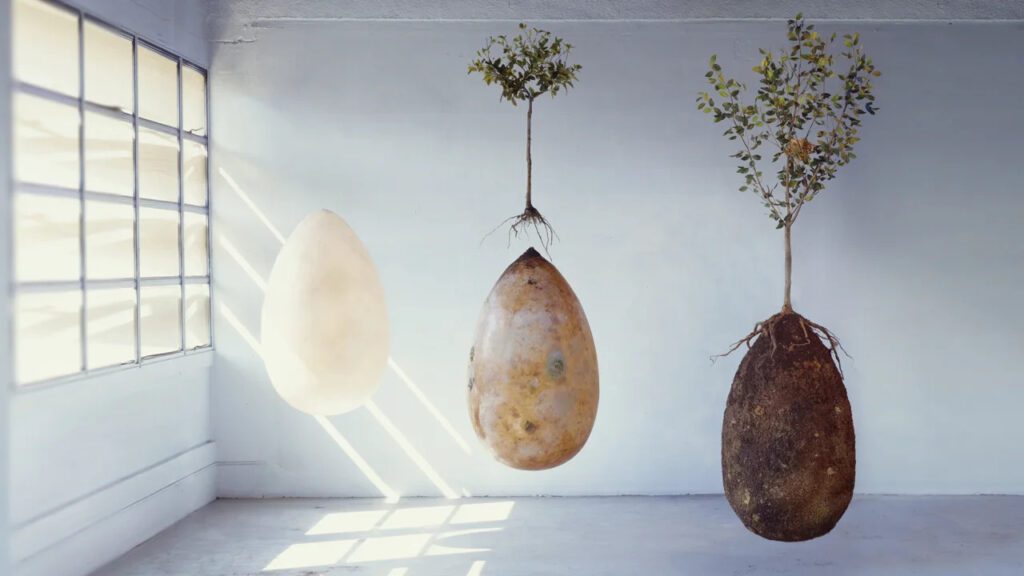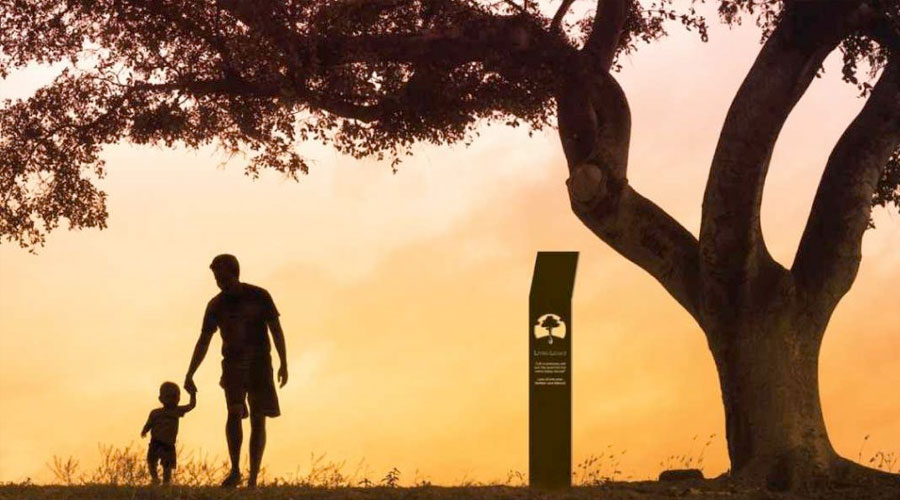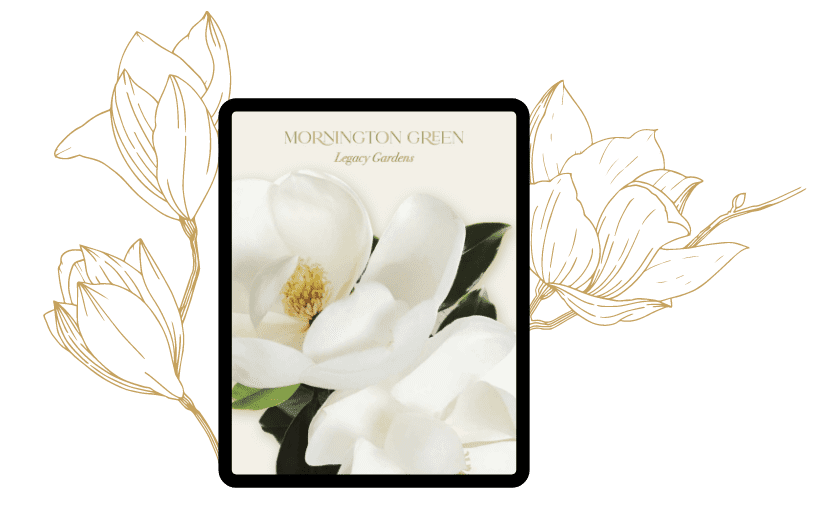Nowadays, there are more ways than ever to say goodbye using a method our family truly connects with. Whether that’s driven religiously or environmentally – or simply by the cost – celebrating the afterlife is less traditional than it’s ever been.
Choosing your afterlife: Where do you begin?
At Mornington Green, we’re all about the positive impact on the planet, yet there are ways to incorporate all of a person’s wants and needs into a life celebration.
For most people today, finding a suitable afterlife option comes down to a handful of key factors:
Cost – traditional funerals are astronomically expensive and, for many families, unaffordable
Carbon footprint – as a nation, Australians are becoming extremely eco-friendly, with many of us keen to choose green options wherever possible
Creed – while some of us feel bound by our religious beliefs and processes, a growing majority of non-practising people want a celebration outside of a church
If you consider yourself to be green-conscious, cost-conscious, non-religious – or all three – then read on because today, we’re comparing two afterlife options that are practical and suit your objectives:
The tree burial pod and the legacy tree.
While our specialism at Mornington Green is legacy trees, we also know how the burial pod is growing in popularity and might be the better option for you or your loved ones after you pass. This guide will help you understand one from the other so you can make one of your most critical decisions about your afterlife wishes.
Tree Burial Pod

You may have heard about the tree burial pod already – and not surprisingly when it has become one of the fastest-growing concepts globally for afterlife in the last decade.
A tree burial pod is a small environmentally-friendly vessel – or ‘urn’ – which holds the ashes of a passed one and is then buried in the earth beneath a new tree sapling. The ashes fuel the sapling’s growth, progressing its journey towards becoming a fully-grown tree.
Pros of a tree burial pod
Supports new growth
If you’re wondering how ashes help a tree to grow, it’s all down to how they are treated. Toxins are neutralised and the nutrients given a boost, which then feeds the tree roots positively to strengthen the growth.
Closes the circle of life
How incredible to think yours or a loved one’s ashes support future life. That’s what a burial pod presents to you, with the remains put to incredible use helping the planet.
All-natural option
Most burial pods are biodegradable, capable of breaking down after their burial underground. That’s zero harm to the environment as you might expect from other buried objects.
Reduces your carbon footprint
Burying a coffin takes up considerable space (not to mention the amount of energy used in its production). A pod takes up a smaller land area – which is better for the environment.
No family fall-outs about who keeps the ashes
A loved one’s remains should never be the cause of argument, yet they so often are when kept in an urn. Burying the ashes in a special place keeps things fair for everyone.
Pods are super low cost!
The pod itself can cost as little as $250*, saving you thousands of dollars on the cost of a traditional funeral.
Cons of a burial pod
Legal complexities
Burial pods remain illegal in most of Australia – there are extremely few places where they are permitted.
In some states, burials without a coffin are limited. Where biodegradable urns are permitted after a cremation, many won’t allow for tree planting. Some local governments permit a burial pod on private property but only with approval. It’s a highly complex option with different hurdles to jump, depending on where you live.**
Some pods are less eco-friendly than others
Even so-called eco-friendly plastics can take years to break down once buried, leaving some pods less ‘green’ than you might think.
A rigid place of eternal rest
Planting ashes in a burial pod alongside a tree is rigid – no more so than a fixed grave and headstone, of course. Still, all family members need to agree on where that special burial place will be, which can be a difficult decision to reach.
Cultural beliefs
Modern afterlife methods like burial pods do not always align with traditional ceremonies, making them unsuitable for some families.
Emotional connection
Traditional burial practices use a grave as a way for the living to connect with those who have passed. A burial pod may lack the emotional connection a grave provides to some.
Tree Survival
Your tree or plant has no guarantees of successful growth thanks to environmental factors – the climate, ground conditions and bugs. This means the benefits some people might expect from this method are not a given.
Long-term maintenance
A tree or plant requires ongoing care – water, food and regular cutting back. It might be your responsibility to take care of your tree to help it grow, and not the cemetery’s.
Uncertain outcomes
We don’t yet know the impact of burial pods on the environment. Potential benefits to the earth and plant life may not actually be as positive as we think – only time and scientific studies will tell.
Living Legacy Tree

Picture a garden filled with new trees, all planted in memory of people who have passed, with families sitting among the trees happily sharing stories and celebrating the life lost.
This is what a Mornington Green legacy garden looks like – a natural space filled with legacy trees, all commemorating loved ones who have passed and using their remains to help the trees grow. Not surprisingly, it is growing in popularity as a respectful, sustainable and highly personal option for afterlife.
After the ashes are carefully treated, you can choose to infuse them into the soil near an existing tree, or plant them together with the sapling of a new tree. Either way, it provides a place of beauty for the generations to come, connecting and honouring the life lost.
Pros of a Legacy Tree
Simple but highly personable
No need for costly or fiddly funeral directors; simply select a tree and have your loved one’s remains infused into the soil close-by. Then enjoy watching it grow!
Your afterlife, your way
One of the best things about a legacy tree is the choice to select your own tree – whether it’s one already growing or a new one to plant along with your ashes.
Eco-friendly afterlife
Clearing spaces for cemeteries is harmful to the environment. Burying ashes in the soil takes up less space and gives back to the earth eternally.
Helps retain our green space
Whether you bury your ashes next to an existing tree or choose to plant a new one, legacy trees promote sustainable, natural use of our land.
A truly natural send-off
Placing a loved one’s remains within nature itself is beautiful and befitting of a human life born and lived completely naturally. You’ll feel naturally good for doing it.
A happy place to visit
Legacy gardens are a place of absolute beauty. No more crouching next to a cold, grey headstone; sitting on the grass beside your legacy tree and surrounded by nature is a joy.
Carbon footprint conscious
Unlike a coffin burial, a legacy tree afterlife has a minimal environmental impact – taking up less space, less energy and helping produce more carbon dioxide through trees.
A place for family celebrations
Instead of having an ashes urn on a mantelpiece (or worse – hidden away in a closet), a legacy tree provides a place for families to come together regularly and create more memories.
Less costly than a traditional funeral
Where old-fashioned funerals stretch into the tens of thousands of dollars, a legacy tree memorial will cost you much less upfront and with zero hidden fees ongoing.
Cons of a legacy tree
A true commitment
Once your loved one’s ashes go into the ground, they are gone forever. You need to be 100% sure about the type of tree – existing or new (and where you’re choosing to plant it) to honour the life passed.
Limited tree choice
Perhaps your loved one wanted a particular tree type that isn’t available locally – it won’t thrive in the Australian climate, for example. While Mornington Green’s expert team can help find an alternative, you may need to be flexible about your original request.
Victoria based
Currently, the Morning Green legacy garden is only based on the Mornington Peninsular near Melbourne.
Not supported by all religions
Many religions have long-standing practices for the afterlife, and legacy trees may not be permitted based on the cremation element of the process.
We hope our article has given you food for thought about the benefits of burial pods and legacy trees, two different options for a sustainable afterlife celebration. Our primary goal is helping people like you make the right decision – even if that decision isn’t us.
Do you want to learn more about legacy trees with Mornington Green? Enquire today.



